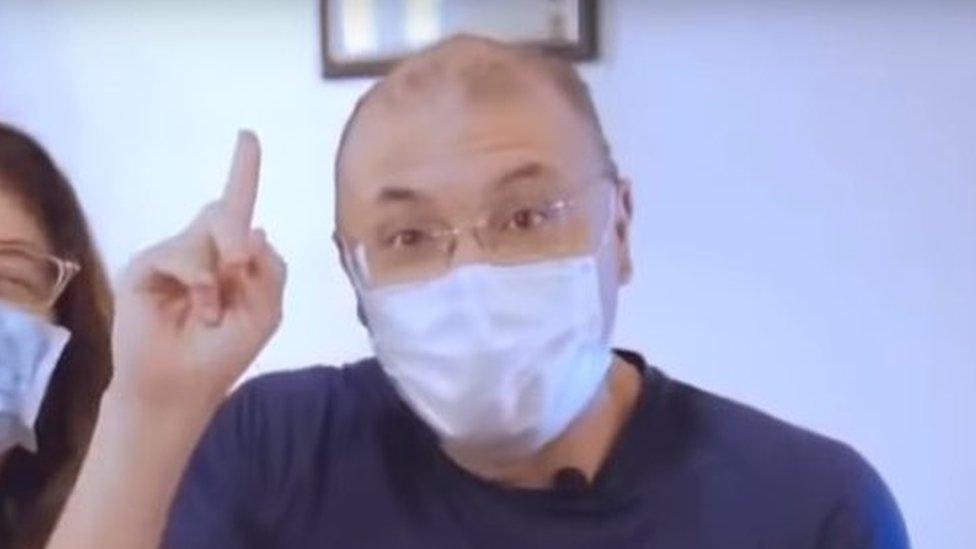Covid-19: Second doses run dry in Brazil's scramble to vaccinate
- Published
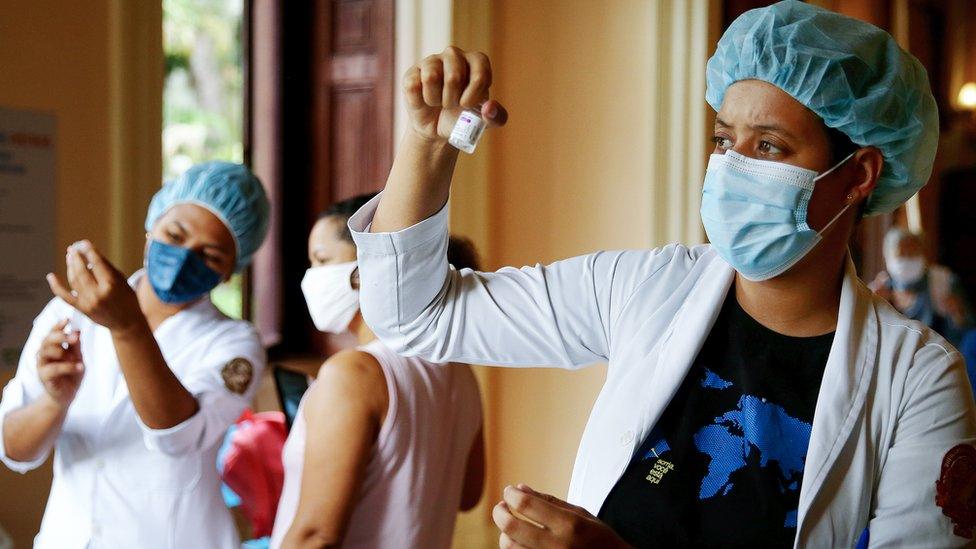
Many cities and states are struggling to carry out their vaccination campaigns with insufficient doses
Vinicius Alexis da Cruz felt a wave of relief when his turn came to take the Covid-19 vaccine.
As the virus ravaged Brazil, the 32-year-old had spent more than a year risking his life, working as an Uber driver. Diabetes and high blood pressure made Mr Cruz especially vulnerable. But he kept driving passengers across São Paulo to make ends meet.
"I was really scared of getting sick," said the father of one, who lost his job as a sports commentator before the pandemic hit. "But I was taking the risk because I had to keep working."
Mr Cruz got his first dose of CoronaVac in late May. But when the time came to get his second jab, he was turned away. "Nobody had a vaccine for me," he said. "I went to five clinics near my house. I couldn't find it anywhere. The same thing happened the next day, and the day after that."
He scoured the city for four days before he got his hands on a second shot. "Finally, I'm fully vaccinated. But it became really clear to me just how short we are on vaccines."
Like Mr Cruz, millions are struggling to get their second shot of the Covid-19 vaccine, dealing a blow to Brazil's already troubled vaccination campaign. Some 3.1 million Brazilians had not had their second jab as of 4 July despite being eligible for it, according to researchers tracking vaccinations.
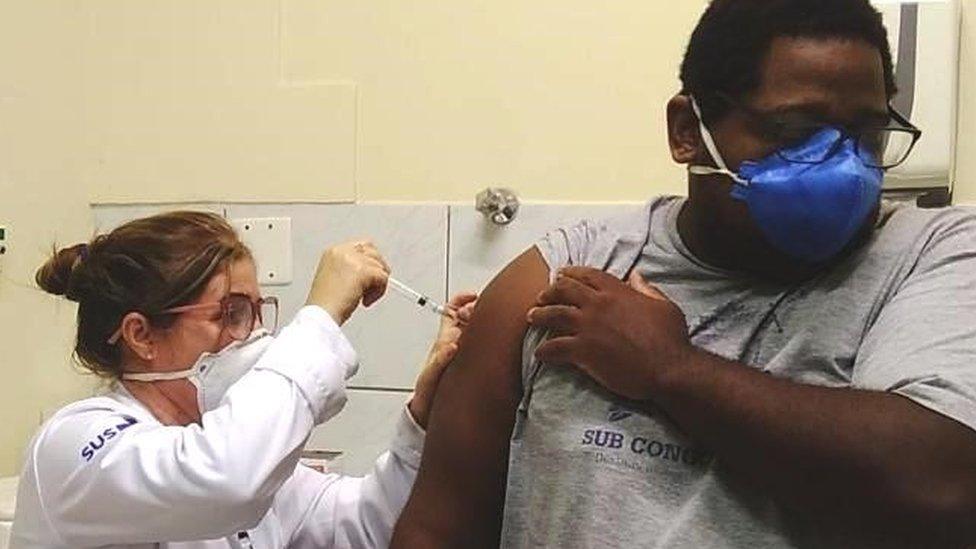
Vinicius Alexis da Cruz received his first jab in May, but was turned away when he tried to get his second dose
Some have intentionally skipped their second dose, falling for misinformation campaigns that have sowed doubts about the vaccine or claimed a single shot offers enough protection. But the main hurdle has been a supply crunch of doses driven by a rushed vaccine rollout, said Dr Ligia Bahia, a public health specialist at the Federal University of Rio de Janeiro.
"There is this drive to speed up vaccination with the first dose," said Dr Bahia, one of the researchers tracking immunisations. "And the second dose has ended up on the backburner."
Coronavirus has claimed more than 530,000 lives in Brazil, a toll second only to the United States. Yet only about 40% of Brazilians have received at least one dose of the vaccine and just 15% are fully immunised.
 Global vaccine rollout
Global vaccine rollout
Percent of people fully vaccinated
| World |
61
|
12,120,524,547 |
| China |
87
|
3,403,643,000 |
| India |
66
|
1,978,918,170 |
| US |
67
|
596,233,489 |
| Brazil |
79
|
456,903,089 |
| Indonesia |
61
|
417,522,347 |
| Japan |
81
|
285,756,540 |
| Bangladesh |
72
|
278,785,812 |
| Pakistan |
57
|
273,365,003 |
| Vietnam |
83
|
233,534,502 |
| Mexico |
61
|
209,179,257 |
| Germany |
76
|
182,926,984 |
| Russia |
51
|
168,992,435 |
| Philippines |
64
|
153,852,751 |
| Iran |
68
|
149,957,751 |
| UK |
73
|
149,397,250 |
| Turkey |
62
|
147,839,557 |
| France |
78
|
146,197,822 |
| Thailand |
76
|
139,099,244 |
| Italy |
79
|
138,319,018 |
| South Korea |
87
|
126,015,059 |
| Argentina |
82
|
106,075,760 |
| Spain |
87
|
95,153,556 |
| Egypt |
36
|
91,447,330 |
| Canada |
83
|
86,256,122 |
| Colombia |
71
|
85,767,160 |
| Peru |
83
|
77,892,776 |
| Malaysia |
83
|
71,272,417 |
| Saudi Arabia |
71
|
66,700,629 |
| Myanmar |
49
|
62,259,560 |
| Chile |
92
|
59,605,701 |
| Taiwan |
82
|
58,215,158 |
| Australia |
84
|
57,927,802 |
| Uzbekistan |
46
|
55,782,994 |
| Morocco |
63
|
54,846,507 |
| Poland |
60
|
54,605,119 |
| Nigeria |
10
|
50,619,238 |
| Ethiopia |
32
|
49,687,694 |
| Nepal |
69
|
46,888,075 |
| Cambodia |
85
|
40,956,960 |
| Sri Lanka |
68
|
39,586,599 |
| Cuba |
88
|
38,725,766 |
| Venezuela |
50
|
37,860,994 |
| South Africa |
32
|
36,861,626 |
| Ecuador |
78
|
35,827,364 |
| Netherlands |
70
|
33,326,378 |
| Ukraine |
35
|
31,668,577 |
| Mozambique |
44
|
31,616,078 |
| Belgium |
79
|
25,672,563 |
| United Arab Emirates |
98
|
24,922,054 |
| Portugal |
87
|
24,616,852 |
| Rwanda |
65
|
22,715,578 |
| Sweden |
75
|
22,674,504 |
| Uganda |
24
|
21,756,456 |
| Greece |
74
|
21,111,318 |
| Kazakhstan |
49
|
20,918,681 |
| Angola |
21
|
20,397,115 |
| Ghana |
23
|
18,643,437 |
| Iraq |
18
|
18,636,865 |
| Kenya |
17
|
18,535,975 |
| Austria |
73
|
18,418,001 |
| Israel |
66
|
18,190,799 |
| Guatemala |
35
|
17,957,760 |
| Hong Kong |
86
|
17,731,631 |
| Czech Republic |
64
|
17,676,269 |
| Romania |
42
|
16,827,486 |
| Hungary |
64
|
16,530,488 |
| Dominican Republic |
55
|
15,784,815 |
| Switzerland |
69
|
15,759,752 |
| Algeria |
15
|
15,205,854 |
| Honduras |
53
|
14,444,316 |
| Singapore |
92
|
14,225,122 |
| Bolivia |
51
|
13,892,966 |
| Tajikistan |
52
|
13,782,905 |
| Azerbaijan |
47
|
13,772,531 |
| Denmark |
82
|
13,227,724 |
| Belarus |
67
|
13,206,203 |
| Tunisia |
53
|
13,192,714 |
| Ivory Coast |
20
|
12,753,769 |
| Finland |
78
|
12,168,388 |
| Zimbabwe |
31
|
12,006,503 |
| Nicaragua |
82
|
11,441,278 |
| Norway |
74
|
11,413,904 |
| New Zealand |
80
|
11,165,408 |
| Costa Rica |
81
|
11,017,624 |
| Ireland |
81
|
10,984,032 |
| El Salvador |
66
|
10,958,940 |
| Laos |
69
|
10,894,482 |
| Jordan |
44
|
10,007,983 |
| Paraguay |
48
|
8,952,310 |
| Tanzania |
7
|
8,837,371 |
| Uruguay |
83
|
8,682,129 |
| Serbia |
48
|
8,534,688 |
| Panama |
71
|
8,366,229 |
| Sudan |
10
|
8,179,010 |
| Kuwait |
77
|
8,120,613 |
| Zambia |
24
|
7,199,179 |
| Turkmenistan |
48
|
7,140,000 |
| Slovakia |
51
|
7,076,057 |
| Oman |
58
|
7,068,002 |
| Qatar |
90
|
6,981,756 |
| Afghanistan |
13
|
6,445,359 |
| Guinea |
20
|
6,329,141 |
| Lebanon |
35
|
5,673,326 |
| Mongolia |
65
|
5,492,919 |
| Croatia |
55
|
5,258,768 |
| Lithuania |
70
|
4,489,177 |
| Bulgaria |
30
|
4,413,874 |
| Syria |
10
|
4,232,490 |
| Palestinian Territories |
34
|
3,734,270 |
| Benin |
22
|
3,681,560 |
| Libya |
17
|
3,579,762 |
| Niger |
10
|
3,530,154 |
| DR Congo |
2
|
3,514,480 |
| Sierra Leone |
23
|
3,493,386 |
| Bahrain |
70
|
3,455,214 |
| Togo |
18
|
3,290,821 |
| Kyrgyzstan |
20
|
3,154,348 |
| Somalia |
10
|
3,143,630 |
| Slovenia |
59
|
2,996,484 |
| Burkina Faso |
7
|
2,947,625 |
| Albania |
43
|
2,906,126 |
| Georgia |
32
|
2,902,085 |
| Latvia |
70
|
2,893,861 |
| Mauritania |
28
|
2,872,677 |
| Botswana |
63
|
2,730,607 |
| Liberia |
41
|
2,716,330 |
| Mauritius |
74
|
2,559,789 |
| Senegal |
6
|
2,523,856 |
| Mali |
6
|
2,406,986 |
| Madagascar |
4
|
2,369,775 |
| Chad |
12
|
2,356,138 |
| Malawi |
8
|
2,166,402 |
| Moldova |
26
|
2,165,600 |
| Armenia |
33
|
2,150,112 |
| Estonia |
64
|
1,993,944 |
| Bosnia and Herzegovina |
26
|
1,924,950 |
| Bhutan |
86
|
1,910,077 |
| North Macedonia |
40
|
1,850,145 |
| Cameroon |
4
|
1,838,907 |
| Kosovo |
46
|
1,830,809 |
| Cyprus |
72
|
1,788,761 |
| Timor-Leste |
52
|
1,638,158 |
| Fiji |
70
|
1,609,748 |
| Trinidad and Tobago |
51
|
1,574,574 |
| Jamaica |
24
|
1,459,394 |
| Macau |
89
|
1,441,062 |
| Malta |
91
|
1,317,628 |
| Luxembourg |
73
|
1,304,777 |
| South Sudan |
10
|
1,226,772 |
| Central African Republic |
22
|
1,217,399 |
| Brunei |
97
|
1,173,118 |
| Guyana |
58
|
1,011,150 |
| Maldives |
71
|
945,036 |
| Lesotho |
34
|
933,825 |
| Yemen |
1
|
864,544 |
| Congo |
12
|
831,318 |
| Namibia |
16
|
825,518 |
| Gambia |
14
|
812,811 |
| Iceland |
79
|
805,469 |
| Cape Verde |
55
|
773,810 |
| Montenegro |
45
|
675,285 |
| Comoros |
34
|
642,320 |
| Papua New Guinea |
3
|
615,156 |
| Guinea-Bissau |
17
|
572,954 |
| Gabon |
11
|
567,575 |
| Eswatini |
29
|
535,393 |
| Suriname |
40
|
505,699 |
| Samoa |
99
|
494,684 |
| Belize |
53
|
489,508 |
| Equatorial Guinea |
14
|
484,554 |
| Solomon Islands |
25
|
463,637 |
| Haiti |
1
|
342,724 |
| Bahamas |
40
|
340,866 |
| Barbados |
53
|
316,212 |
| Vanuatu |
40
|
309,433 |
| Tonga |
91
|
242,634 |
| Jersey |
80
|
236,026 |
| Djibouti |
16
|
222,387 |
| Seychelles |
82
|
221,597 |
| Sao Tome and Principe |
44
|
218,850 |
| Isle of Man |
79
|
189,994 |
| Guernsey |
81
|
157,161 |
| Andorra |
69
|
153,383 |
| Kiribati |
50
|
147,497 |
| Cayman Islands |
90
|
145,906 |
| Bermuda |
77
|
131,612 |
| Antigua and Barbuda |
63
|
126,122 |
| Saint Lucia |
29
|
121,513 |
| Gibraltar |
123
|
119,855 |
| Faroe Islands |
83
|
103,894 |
| Grenada |
34
|
89,147 |
| Greenland |
68
|
79,745 |
| St Vincent and the Grenadines |
28
|
71,501 |
| Liechtenstein |
69
|
70,780 |
| Turks and Caicos Islands |
76
|
69,803 |
| San Marino |
69
|
69,338 |
| Dominica |
42
|
66,992 |
| Monaco |
65
|
65,140 |
| Saint Kitts and Nevis |
49
|
60,467 |
| British Virgin Islands |
59
|
41,198 |
| Cook Islands |
84
|
39,780 |
| Anguilla |
67
|
23,926 |
| Nauru |
79
|
22,976 |
| Burundi |
0.12
|
17,139 |
| Tuvalu |
52
|
12,528 |
| Saint Helena |
58
|
7,892 |
| Montserrat |
38
|
4,422 |
| Falkland Islands |
50
|
4,407 |
| Niue |
88
|
4,161 |
| Tokelau |
71
|
1,936 |
| Pitcairn |
100
|
94 |
| British Indian Ocean Territory |
0
|
0 |
| Eritrea |
0
|
0 |
| North Korea |
0
|
0 |
| South Georgia and the South Sandwich Islands |
0
|
0 |
| Vatican |
0
|
0 |
Please upgrade your browser to see the full interactive
This information is regularly updated but may not reflect the latest totals or vaccines administered for each location. Total doses may include booster doses in addition to those required for full vaccination. The definition of full vaccination varies by location and vaccine type and is subject to change over time. Full vaccination can refer to a person receiving all required doses of a specific vaccine or sometimes recovery from infection plus one dose of a vaccine. Definitions have not yet been updated to account for booster campaigns to control the spread of new variants. Some locations may reach vaccination rates over 100%, such as Gibraltar, due to population estimates that are lower than the number of people who have now been vaccinated in that place.
Source: Our World in Data
Last updated: 5 July 2022, 13:28 BST
Unlike some other countries, Brazil chose not to hold back supplies for second doses. Its vaccination campaign has mostly relied on CoronaVac shots, made locally using inputs from China's Sinovac. But shipments of Chinese materials have lagged, just as millions are due for their second jab.
And other vaccines have been slow to trickle into Brazil, after President Jair Bolsonaro snubbed early vaccine offers from Pfizer, opting to promote ineffective treatments instead, such as hydroxychloroquine.
He is one of the few leaders in the world who has not yet been vaccinated. And now his government is also under investigation for plans to buy millions of Covaxin shots at wildly inflated prices.
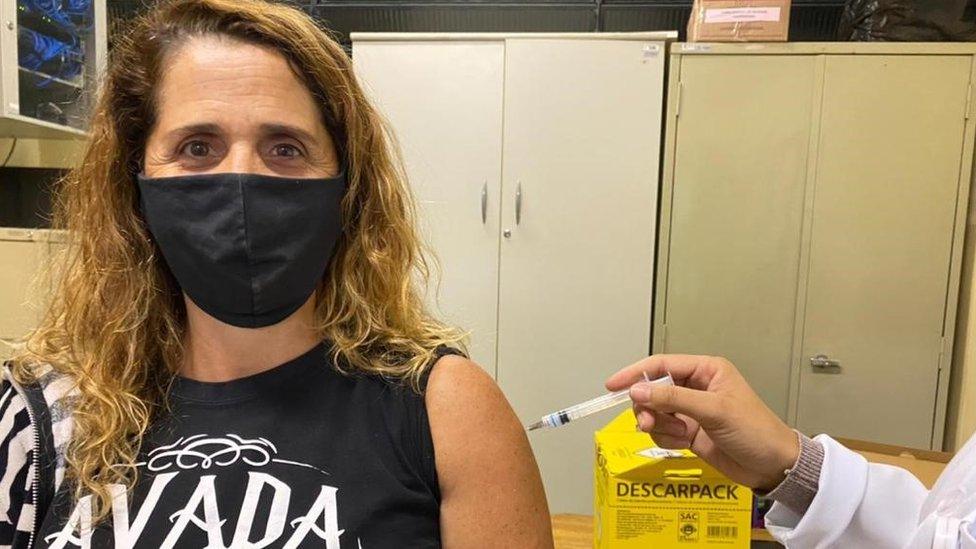
Simone Spadari Da Costa Moura says a political tug of war is hurting Brazil's vaccination efforts
In early July, Simone Spadari Da Costa Moura arrived at a clinic in São Paulo, ready for her second jab. But she, like many others, was turned away as CoronaVac doses ran out.
She blames policymakers, who she says are locked in a political tug of war that is hurting Brazil's vaccination efforts.
"They want to show they're speeding things up - but they are not thinking about the second dose," said Ms Moura, a former schoolteacher. "It's a political war. And we're in the middle of it. For us, we just want to be vaccinated and not get Covid."
While a longer interval between doses appears to boost the efficacy of vaccines like Pfizer and AstraZeneca, research into the impact of delaying a second CoronaVac shot is still lacking. Some experts fear a longer wait could even hinder the effects of the Chinese vaccine, which already may be less effective at preventing serious cases of Covid-19.
It was these unknowns that worried Aline Nogueira Mariano, when she was told there was no second dose for her. At high-risk due to pre-existing illness, Ms Mariano, 32, took the first dose in late May but struggled to find a second CoronaVac shot.
"I spent days calling every clinic, searching for the vaccine," said Ms Mariano, who owns an online jewellery store. "It was really distressing, I was so worried. My fear was that I would miss the window to take the second dose and get fully immunised."
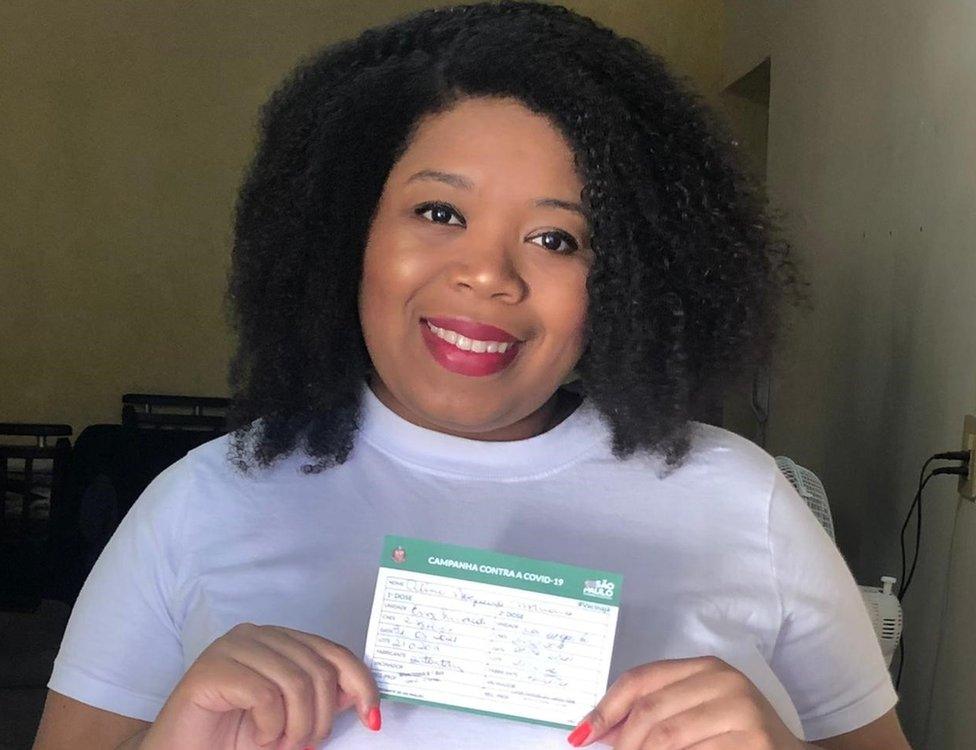
Aline Nogueira Mariano managed to get a second shot only after a week-long search
But perhaps the biggest risk is that, with full vaccination delayed, the virus will continue posing a threat to Brazilians, said Dr Gerson Salvador, an infectious disease specialist at the University Hospital of São Paulo.
"There needs to be an easy way for people to get vaccinated," Dr Salvador said. "Without it, some will inevitably give up on getting the second dose. And, unless a large majority of people are fully vaccinated, we will continue to be a long way off from controlling the pandemic."
This is especially worrying as new strains gain traction in Brazil, where authorities have long ago scrapped even loose sanitary measures and many unvaccinated Brazilians are foregoing basic precautions like social distancing and mask wearing. Some variants have proven more dangerous to healthy young adults, posing a threat to Brazilians still waiting for their jab.
After a week-long search, Ms Moura finally got her second dose early this week, as a clinic near her home received a fresh batch of vaccines. She says it brought her relief - and fresh hope for the future.
"You feel that you are more protected, that you're safer," she said. "It's this feeling... that things are getting better."
CHINESE VACCINES: What we know about them
ON THE GROUND: 'Everything you should not do, Brazil has done'
ANALYSIS: What's gone wrong with Covid in Brazil?

You may want to watch:
How remote Amazon communities are given the Covid-19 vaccine.
Related topics
- Published3 July 2021
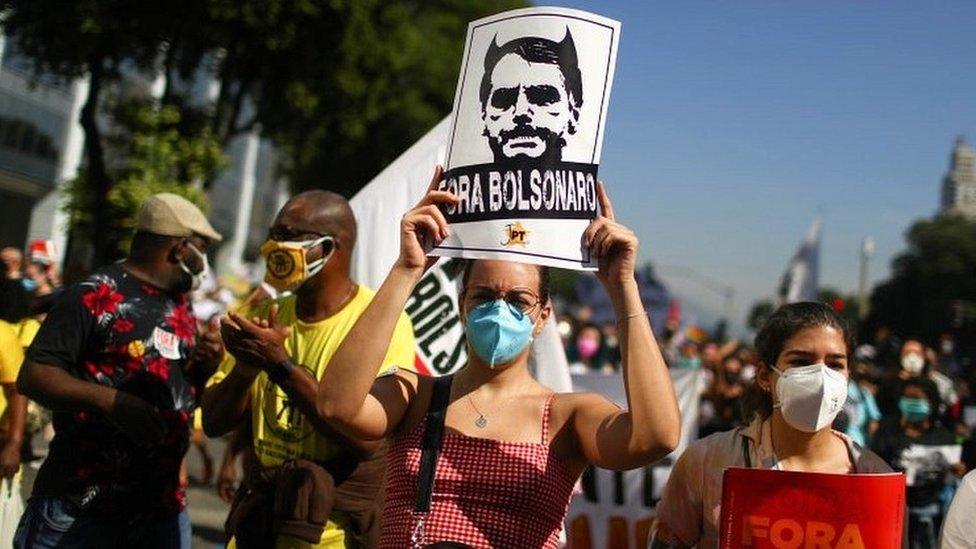
- Published20 June 2021
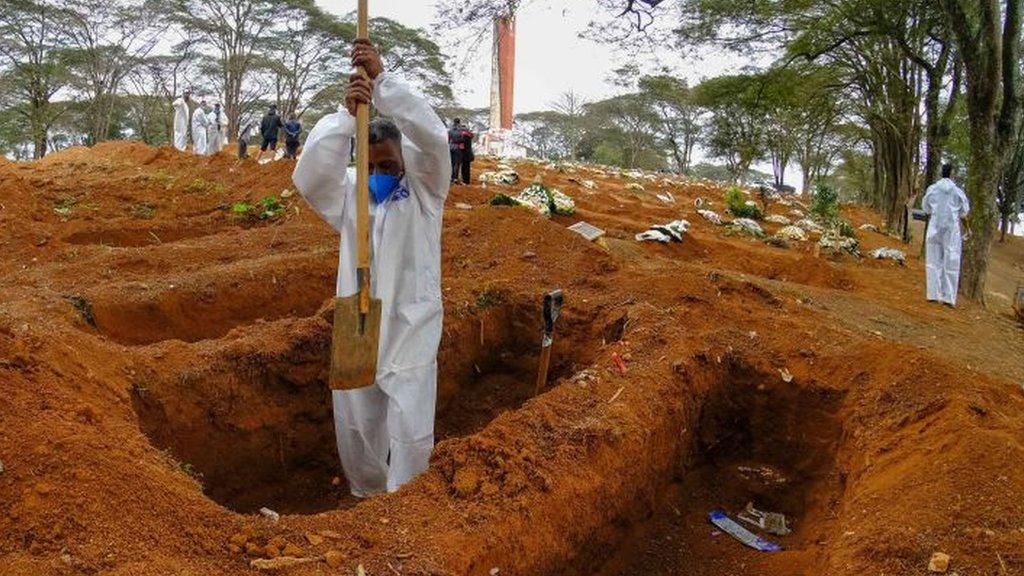
- Published9 June 2021
